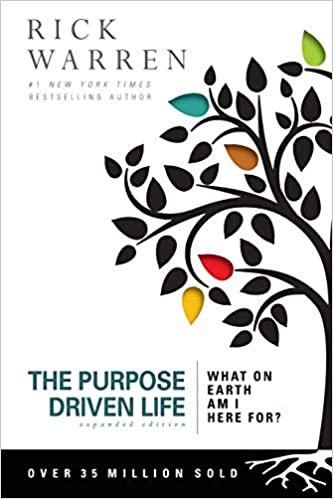Here is an existential question for you: why does the meaning of life matter? This isn’t just about how to find your meaning in life, but why that meaning matters.
Believe it or not, meaning in life isn’t just a philosophical or theoretical construct. It can affect your health and well-being.
Today, our topic is why it matters that we know our meaning of life. From ancient Greek philosophers’ perspectives to science-proven, physical importance, let’s get started!

The Purpose Driven Life
by Rick Warren
⏱ 15 minutes reading time
🎧 Audio version available
Now, you may think, “Is it really that important to have meaning in life? Can we just go on, living our lives without thinking about these questions?”
Humans are the only creatures capable of questioning their own existence, so it’s no wonder that the quest to find meaning and purpose is as old as time.
We can trace this existential question back to millennia ago. Around 2,000 years ago, Greek philosopher, Aristotle, said he believed that meaning in life was not merely achieving subjective feelings of happiness. No, he believed that only by cultivating individual development of our true nature, would we be able to reach our full potential.
If we turn to other philosophers, such as Plato, his answer is the meaning of life can be found in the pursuit of knowledge. He even quotes his mentor and teacher, Socrates, who said, “the unexamined life is not worth living.”
Epicurious, the ancient Greek philosopher whose ideas mainly surrounded materialism, believed that the meaning of life mattered because it meant achieving sustainable pleasure that will lead to a state of tranquility and freedom from fear, which he called, “ataraxia.”
Aristotle, Plato, and Epicurious weren’t the only ones to question the meaning of life and why it matters. Throughout history, it’s been proven that humans hunger for meaning, for purpose, and for that fulfilling feeling that our lives are worth more than the sum of their parts.
Thankfully, that hunger becomes resourcefulness. Nowadays, we have a number of ways of finding meaning, and a number of potential sources to provide it; you can find meaning in every event, scenario, occurrence, context, the absurd, perfection, the dull, the dreary, etc.
The question “what is the meaning of life” often overshadows the equally important question, “why does knowing the meaning of life matter?” How does it affect us?
We can go the obvious way and detail the advantages of having a strong purpose and meaning in life. In a study that examined individuals who reported a higher meaning in life than others, they found that these individuals had–
- Increased, deeper connections with friends
- More engagement in social and cultural activities
- Lower risk of living alone
- Lower risk of divorce
- Lower risk of chronic diseases
- Lower risk of onset of depression
- Lower risk of obesity
- Increased physical activity
- And lastly, increased positive health behaviors, such as eating healthy, exercising, etc.
Generally, people with a higher sense of meaning in life are characterized by health and well-being. A researcher, Laura King, looked into this, and said, “lives may be experienced as meaningful when they are felt to have a significance beyond the trivial or momentary, to have purpose, or to have a coherence that transcends chaos.”
So, we can break down King’s point of view into three components, the first being purpose, which means having goals and direction in life. The next is life significance, which is how much value and worth a person believes their life has. Lastly, we have coherence, which is the sense that your life is characterized by routine and predictability.
Difference Between a Meaningful Life and a Happy Life
There is something we would like to point out, which is there is a difference between a meaningful life and a happy one. For example, a meaningful life is often related not so much with day to day joy and contentment as much as actual fulfillment.
So, leading a meaningful life may not equal being happy. Meaningful activities are meant to leave something behind, and these activities aren’t necessarily ones that we do most often or that bring us the most joy.
For example, happiness is mostly present oriented. On the other hand, meaningfulness involves integrating the past, the present, and the future. Happiness is also linked to being more of a taker than a giver. Higher meaning is actually linked to higher levels of worry, stress, and anxiety; the same things that are linked to lower happiness.
You can’t rely on others to explain the meaning of your life. No interpretation other than your own really counts. Unfortunately, that means that you have to work out, and this is a life-long process of experience and introspection, what is meaningful to you.
This answer may be unsatisfactory to others, but the meaning of life, and the subsequent importance that you know it, is unique to each and every person.
Some find meaning in their families, in the love of their partners and children. Others find it in their careers and the work they do. You may find it in giving back, volunteering, and doing charity. Until you get out and experience things, you can’t really know the importance of finding meaning, and what brings you the most fulfillment.
Take Viktor Frankl for example, the author of the 1945 book, “Man’s Search for Meaning.” Frankl was a Holocaust survivor, a prisoner in Auschwitz and Dachau, and lost his family. In his search to find meaning, he ultimately decided that the meaning of life is in discovering a purpose and taking responsibility for ourselves and others.
After finding a crystal clear “why,” you can delve deeper into the “how” questions of the world. He believed that feeling free and certain of your objective would ultimately motivate you to make the world a better place.
His life in the concentration camp taught him that our main motivation and drive in life isn’t pleasure, as Greek philosophers often believed, nor is it power. Frankl believed that this motivation is brought on by experiencing reality by interacting with the environment and others. He also believed that it’s found by giving something back to the world through self-expression and creativity.
He wrote, “the point is not what we expect from life, but rather, what life expects from us.”
Frankl’s book inspired millions of people to identify their attitude towards life, guided by Frankl’s own strength. He goes by three specific points in his life: he works day by day with motivation, he lives from a perspective of love, and he focuses on having courage at all times in the face of adversity.
As you grow and mature, your unique meaning and purpose will inevitably change and evolve. It’s important to understand that the answers to your questions in life aren’t necessary on the outside. As we said, others, such as family and friends, can’t just hand you the explanation.
It comes down to this. Discovering the meaning of life is fundamentally important because it provides purpose. Secondly, it provides standards and values that we can use to judge our actions. Having a meaning gives us a certain sense of control over the events in our life that would otherwise be chaotic. And lastly, and probably holding the most importance, having meaning gives us self-worth.
According to Psychologist Jerome Bruner, without meaning, “we would be lost in a murk of chaotic experience and probably would not have survived as a species in any case.”
Time and again, it’s been found that when people aren’t able to find meaning or when they lose or outgrow the meaning they once had, their mental health is negatively affected. A dramatic number of emotional problems stem from the failure to find meaning in life.
In addition, the absence of meaning is linked to psychopathology, and again, living without it, without goals, without values, can provoke considerable distress.
Meaning is found at the core of our experiences. It’s only through this meaning that we can make sense of our existence, what makes life worth living, and what purpose drives us.
What Is Snapreads?

With the Snapreads app, you get the key insights from the best nonfiction books in minutes, not hours or days. Our experts transform these books into quick, memorable, easy-to-understand insights you can read when you have the time or listen to them on the go.


